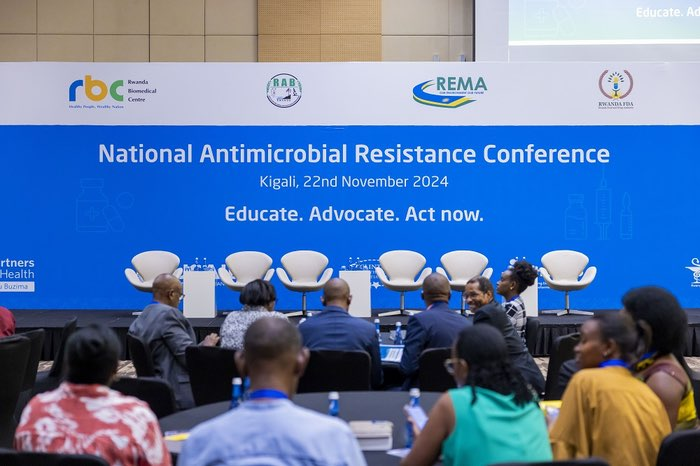
From November 18 to 24, 2024, Rwanda joined the global community in observing Antimicrobial Resistance (AMR) Awareness Week. The week-long campaign focused on raising awareness about the dangers of AMR and promoting the safe use of medicines. Key stakeholders, including those from the agriculture, animal husbandry, and human health sectors, united to drive home the message that antimicrobial resistance is a pressing issue that requires coordinated action.
AMR occurs when bacteria, viruses, fungi, and parasites become resistant to the drugs designed to treat them, rendering infections harder or even impossible to treat. This growing threat not only endangers human health but also impacts food security and economic stability, particularly in low-income countries. The World Health Organization (WHO) highlights that without action, AMR could cause 39 million deaths globally by 2050, a situation exacerbated by the overuse and misuse of antimicrobials in humans, animals, and plants.
In his opening remarks during National conference on Antimicrobial Resistance that took place at Kigali Convention Centre on November 22nd 2024, Professor Claude Mambo Muvunyi highlighted the global and national significance of the AMR challenge, stressing that Rwanda’s rising burden of resistant infections, such as bloodstream infections, underscores the urgency of tackling this issue. “AMR transcends borders and sectors, threatening human health, food security, and the environment,” he stated.
Rwanda has committed to strengthening multisectoral efforts through the launch of its National Action Plan 2.0, which aims to improve the country’s resilience across the One Health spectrum. Rwanda’s national action plan 2.0 aligns with global commitments and builds on past achievements, focusing on surveillance, monitoring, and responsible antimicrobial use across all sectors. It also prioritizes collaboration with international partners and strives to establish robust governance and coordination mechanisms at both national and local levels.
The urgency of combating AMR is heightened by its link to pandemics. Secondary bacterial infections during viral outbreaks, such as COVID-19 and Marburg Virus Disease, are often difficult to treat when resistance renders existing treatments ineffective.
The week culminated in a Car-Free Day and mass sports participation to raise awareness of non-communicable diseases (NCDs) while also reinforcing the fight against AMR. It was a call to action for all Rwandans to handle antimicrobials with care and join the global effort to preserve the effectiveness of these life-saving drugs. (End)
